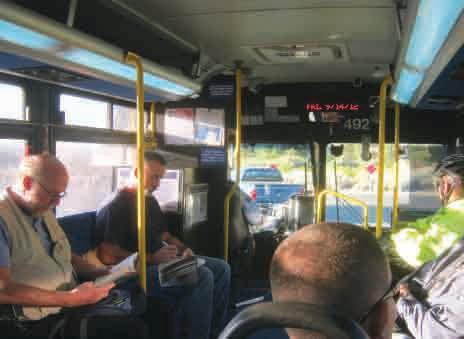
8 minute read
Election
from Sept. 20, 2012
use of detention and torture, and supports marriage equality. He also opposes the Democratic health care plan, supports gun rights, and opposes the level of taxation that currently exists.
Voters registering with the Democratic Party have grown steadily during this campaign year compared to Republicans, but that is likely due to more effective efforts by the Democratic Party as much as to voter preferences. Voter registrations are not usually a good indicator of election outcomes. And Obama is not the rock star he was in 2008, when he drew huge numbers of voters to the polls.
Advertisement
As of the end of July, 451,066 of the state’s voters were Democrats, 402,471 were Republicans and 180,366 were nonpartisan. One Democratic think tank said Nevada is experiencing nonpartisan gains in double-digit percentages, one of two states where independent numbers are growing that fast.
In any event, Republican voter registration efforts could now gain with the arrival of $166,000 from the Republican National Committee for the Nevada GOPregistration campaign.
Probably the biggest disappointment for Republican leaders is the Latino vote. Obama currently enjoys a 39-percentage point lead among those Nevada voters. Republican organization leaders have put in serious effort in recent years to lure those voters to the GOP, but Republican elected officials unable to resist beating the drum for harsher immigration policies have stymied those efforts. Latinos account for a fifth to a quarter of the Nevada electorate.
Significant campaign benchmarks still to come that could provide game-changing moments are the three presidential and one vice presidential debates. Obama and Romney debate on Oct. 3, 16, and 22, and the vice presidential candidates debate on Oct. 11. So far, no other candidates have been admitted to the debates. Ω
Ease of registration doesn’t mean voters will turn out
Interesting reading
State highway officials have been selling the new leg of the Reno/Carson highway like a tourist attraction. But riders on a morning commuter bus between the two cities were pretty blasé about the new route and its new scenery.
Teaching moments
With Nevada’s beleaguered economy playing backdrop to the upcoming elections, it comes as no surprise that funding is a large point of contention in Ken Grein and Howard Rosenberg’s race for the Washoe County School Board in District D. They are using the campaign to try to educate the public on how to cope with the money troubles. “The most pressing problem we face is financial,” said Ken Grein, the incumbent board president and a trustee since 2009. Born and raised in Lovelock Nevada, Grein received a bachelor’s in Elementary and Special Education and a master’s in Education Administration, both from the University of Nevada, Reno. Grein has spent 32 years serving the Washoe County School District in a number of roles, including teacher, coach, principal, assistant superintendent of elementary education, assistant superintendent of K-12, and superintendent of operations. According to Grein, the WCSD has suffered over $120 million in cuts over the past two years, and unfortunately, he said, the future of education funding doesn’t look much brighter. Abond measure currently used to make much-needed capital improvements in Washoe County, such as the repair of heating and air-conditioning systems or the fitting of schools with up-to-date technology, expires in November. If the district can’t obtain the proper funding to meet its capital needs, which Grein estimates to be in excess of $500 million, the board will be forced to take money from the general education fund—right out of the classroom. Grein said the most important task facing the upcoming school board will be to lobby the Nevada Legislature for increased education funding. He said that as part of the previous school board, he’s already gathered a large group of over 800 Washoe County parents to help in this endeavor. “We’re going to have to get the Legislature to come up with some sort of line-item capital funding provided by the state,” Grein said. “If you value education, you have to fund it.” But Grein’s opponent, Howard Rosenberg, disagrees with Grein’s hard focus on the importance of increased funding. “People solve problems, not money,” said Rosenberg. “Every
school system in the world could use more money.” by According to Rosenberg, the probBethany Deines lems confronting the district are not strictly financial, but systemic. Although he recognizes the essential role of funding in K-12 education, he believes the WCSD could better allocate its existing funds. As a school board trustee, Rosenberg said one of the first changes he would make would be a reevaluation of the K-12 curriculum. He believes the goal of education should be for students to attach profound meaning and value to the subjects they’re taught in school. He wants Nevada children to make a deep and personal connection with their educations. “You have to attract the child to something that means something to him or her,” he said. “I’m not saying that we throw everything away, I’m GREIN saying that we reexamine what we’ve got.” Another of Rosenberg’s suggestions is to hold the school board meetings in a rotational circuit among the various K-12 schools in Washoe County. He believes that such a change would not only put the school board in better touch with the needs and problems of Washoe County schools, but allow parents easier access to policy-making that affects their child’s education. Rosenberg’s education beliefs stem from a career-long immersion in education at all levels. He received a bachelor’s degree in art education at the Massachusetts College of Art in 1962 and advanced degrees in education and art at the Harvard Graduate School of Education and School of Design in 1965. He has been an art professor at the University of Nevada, Reno for 46 years, where he serves as the sole undergrad advisor for the art department. Between 1996 and 2008, Rosenberg served on the Nevada Board of Regents that governs higher education in the state. It was his experiences in higher education that led Rosenberg to pursue a position on the Washoe County School Board. Disappointed by the high number of university and community college students required to take remedial classes before entering a college-level curriculum, Rosenberg decided a more radical reinvention of ROSENBERG the K-12 system was necessary. “There’s so much we could do,” said Rosenberg. “The most important thing is to build that wonderful relationship that needs to exist between student and teacher.” Ω





TheBest Jobs In Tahoe!



NOW�HIRING! Apply Online Today.

JOBS.VAILRESORTS.COM
Cash crop
A grant from the U.S. Department of Energy was awarded to University of Nevada, Reno biochemistry professor John Cushman. The grant is for $14.3 million and will allow for Cushman and the other members of his research team, including Anne Borland from Newcastle University, James Hartwell from the University of Liverpool and Xiaohan Yang from the Oak Ridge National Laboratory, to pursue research on crops used for biofuel. According to a statement, the team will “develop novel technologies to redesign bioenergy crops to grow on economically marginal agricultural lands and produce yields of biomass that can readily be converted to biofuels.”
The grant will last for five years, with $7.6 million going to UNR and the rest distributed to other institutions. Cushman is the team leader.

Brain fuel for Washoe students
The University of Nevada, Reno is not the only school receiving grants for new projects. The Washoe County School District recently implemented the Fresh Fruit and Vegetable Program, which provides produce to students at 34 local schools. Schools in which more than half of the students are enrolled in free or reduced lunch are eligible for the program, funded with $2 million from the U.S. Department of Agriculture.
Part of the initiative includes educating students and teachers about healthy foods, spearheaded by UNR’s cooperative extension department and funded by the USDA’s Supplemental Nutrition Assistance Program education project, SNAP-Ed.
Cool runnings
Producing snow for the slopes at Heavenly Mountain Resort will use less energy this year due to brand new snow guns. Ten Viking V2 snow guns were installed at the resort, which create snow by mixing compressed air with cool water.
Heavenly will be rebated $29,913 from NV Energy for the project, and the new guns are estimated to save the resort 378,000 kilowatt hours of electricity and reduce carbon emissions by 283 tons.
Cheating cheatgrass
Western environmental publication High Desert News published an article about local scientists’ work to combat cheatgrass, an invasive species susceptible to wildfires. In the article, University of Nevada, Reno professor Beth Leger and graduate student Owen Baughman were profiled. Leger and Baughman are part of a team of scientists studying the plant species of the Great Basin, and have been researching the growth potential for native Nevada plants such as Poa secunda, a type of grass that grows in tufts. Along with this research, scientists are investigating the impact of a fungus dubbed the Black Fingers of Death on cheatgrass. The scientists are manipulating the fungus to reproduce differently in order to make it as potent as possible on cheatgrass seeds, and are also testing its effect on native plants.
Read the full article at http://bit.ly/S3AsQx.
—Ashley Hennefer
ashleyh@newsreview.com
ECO-EVENT
A concert to benefit the restoration of Bartley Ranch Regional Park will be held on Sept. 22 at the Robert Z. Hawkins Ampitheater. Areas of the park were damaged by fire earlier this year. The band lineup includes Homemade Jam, Electric Catfish, Guitar Woody and the Boilers. Doors open at 5 p.m. and concert starts at 6 p.m. $15 for reserved seats, $10 for lawn. Buy tickets at www.washoecountyparks.com or at the Washoe County Parks Office, 2601 Plumas St., Mon.-Thurs. 7:30 a.m.-5 p.m.
Got an eco-event? Contact ashleyh@newsreview.com. Visit www.facebook.com/RNRGreen for more.
The Electric Catfish









